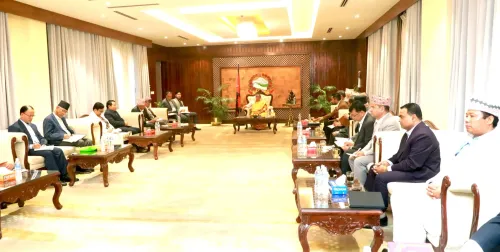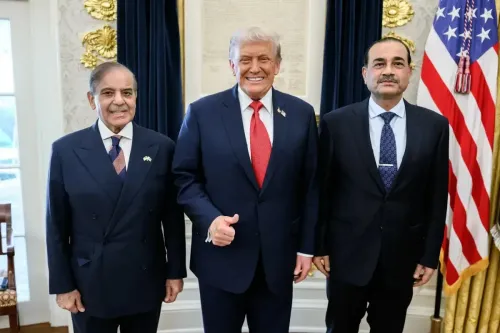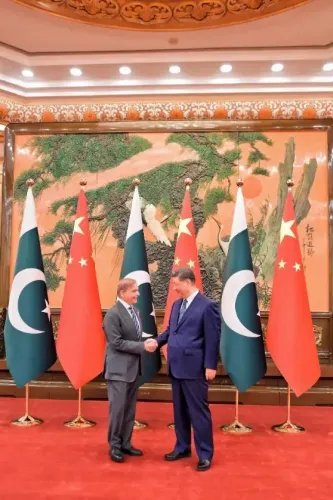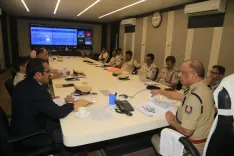What’s Behind Bangladesh’s New Blame Game?
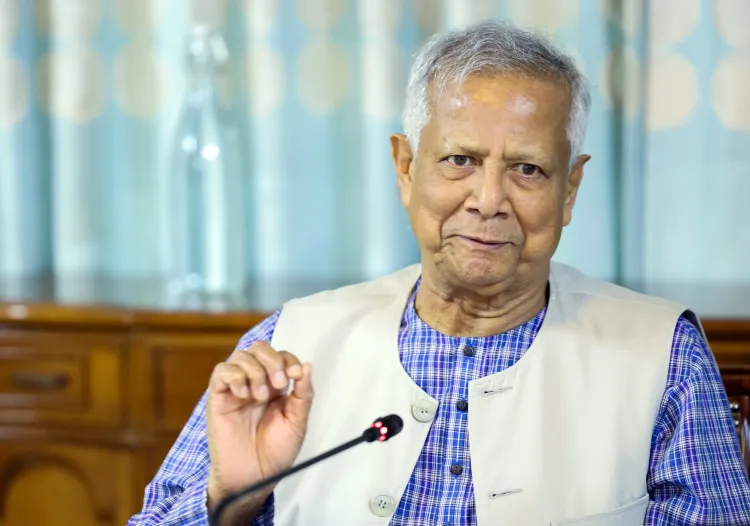
Synopsis
Key Takeaways
- Bangladesh's interim government has banned the Awami League.
- Rising communal violence poses challenges to national stability.
- The government has evaded accountability by blaming external forces.
- International scrutiny over human rights violations is increasing.
- The future of democracy in Bangladesh remains uncertain.
New Delhi, Oct 21 (NationPress) It has been over a year since the interim administration in Bangladesh emerged under the guidance of Muhammad Yunus, resulting in a significant political overhaul both domestically and internationally.
Domestically, the predominant political faction—the Awami League—and its affiliates have been prohibited, while Islamist groups have seen a resurgence, and the legacy of Sheikh Mujibur Rahman is being minimized and even challenged, with discussions around the history of the 1971 Liberation War igniting controversy.
The post-Sheikh Hasina era, often referred to as the 'new' Bangladesh, has been marred by various forms of violence—communal, ethnic, gender-based, mob-related, and political in nature. Consequently, the nation’s law and order is consistently under threat. However, the interim government, which was primarily established to restore stability, has evaded responsibility through tactics of denial and branding dissent as a 'conspiracy' initiated by 'external forces.'
The sidelining of the Awami League was anticipated due to Yunus’s personal grievances with Sheikh Hasina.
This year has seen the interim government employing all available resources—political, judicial, and administrative—to target loyalists and activists of the Awami League while fostering a political climate that presents Bangladesh’s supposedly newfound democracy as devoid of opposition.
In May, Human Rights Watch indicated that the interim government has endangered Bangladesh’s fundamental freedoms through various legislative actions. A recent report from HRW claimed that the interim government has misused the amended Anti-Terrorism Act to target and imprison thousands of political adversaries, particularly those affiliated with the ousted Awami League, under dubious allegations to stifle dissent. The report accurately asserts that this approach is not conducive to a democratic transition.
Bangladesh’s own human rights organizations have criticized the interim government for its excessive force, mirroring the tactics of its predecessor, which it claims to oppose, as they reported a troubling increase in human rights abuses and crimes throughout Bangladesh.
In its quest to suppress the Awami League and position itself as diametrically opposed to its values, the interim government has distanced itself from its neighbor, India.
Labeling its foreign policy as a 'balanced geopolitics,' the Yunus-led interim administration and its backers, including political leaders, have crafted a narrative claiming that India is an 'ally' of Sheikh Hasina and the Awami League.
Through a blatant distortion of Indo-Bangladesh diplomatic relations, anti-Hasina factions are now competing to present themselves as the defenders of Bangladesh’s democracy, a system that has long been jeopardized by Hasina’s pro-India stance. Political parties, especially those opposing the Awami League, have historically utilized anti-India sentiments in their electoral strategies, and the interim government’s rhetoric serves as a defensive mechanism against accountability.
The Chief Advisor has fostered a climate of fear among Bangladeshis, alleging that India’s 'hegemony' is the root cause of the current political turmoil. Frequently, especially when questions arise regarding the inefficacy of law enforcement, as seen during the February Bulldozer Procession in Dhanmondi, the interim government has blamed 'external forces' for its internal strife. Close associates of the Chief Advisor have made provocative statements targeting India’s border security.
Since Hasina’s departure, communal violence has escalated in Bangladesh. When India expressed concern over this alarming trend, the interim government quickly dismissed it as politically motivated, labeling the claims as 'exaggerated.' They echoed similar sentiments regarding reports from the Bangladesh Hindu Buddhist Christian Unity Council, calling them 'misleading' and 'false.'
In a recent interview with a US journalist, Yunus further criticized India, dismissing reports of anti-Hindu violence in Bangladesh as 'fake news,' asserting that such narratives are a 'specialty of India,' while claiming that Bangladesh stands as a 'beacon of religious harmony.'
This is in stark contrast to the US Religious Freedom report, which highlighted troubling conditions for minorities in Bangladesh.
Following the collective failure to ensure safety for Hindus during their largest religious celebration, Durga Puja, last year, similar concerns resurfaced with reports of idol vandalism just days prior to this year's festivities. This year, the home advisor warned of severe consequences for those involved in 793 Durga Puja pavilions for allegedly 'hurting religious sentiments,' while attributing the misinformation surrounding Durga Puja to the 'neighboring country.' Such remarks are believed to further incite communal violence and the persecution of minority groups, particularly Hindus, who constantly find themselves defending their nationalism. Reports indicate that at least 49 incidents occurred at puja mandaps across Bangladesh during Durga Puja this year.
The recent ethnic conflict in Khagrachhari within the Chittagong Hill Tracts underscores the systemic violence in the region, where offenders continue to enjoy a culture of impunity under the interim government. Once again, the administration was quick to blame 'fascist groups' allegedly harbored in the neighboring country for fostering instability in Bangladesh. New Delhi’s response was to call out the absurdity of these claims, pointing to the interim government’s pattern of deflecting blame to obscure its own failures in maintaining law and order.
To mask its ineffectiveness, even after a year in governance, the interim administration has shifted blame onto India. This not only insults the conscience of the Bangladeshi people but also undermines their democratic aspirations. Through the artificially constructed narrative of a 'conspiracy by external forces to destabilize Bangladesh,' the interim government is intentionally postponing the democratic transition that the populace desperately seeks.
Although India has expressed its commitment to a smooth, inclusive, and just democratic transition in Bangladesh, and is prepared to collaborate with any government that assumes power (as should be the case in bilateral relations), the interim government continues to make haughty statements to cling to power. One can only hope that the upcoming national elections will break this deliberate deadlock imposed by the interim government, allowing bilateral relations to flourish in the near future.

